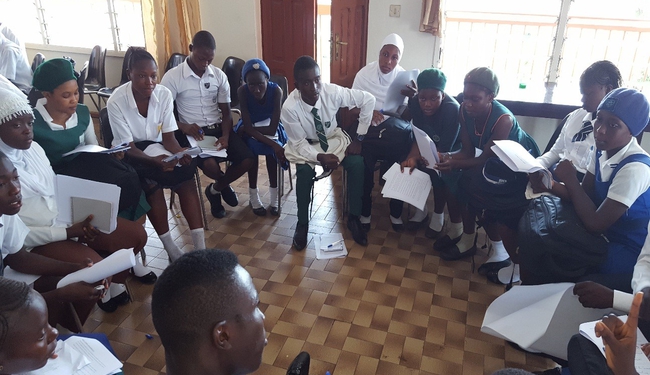Brima Turay, of the Sierra Leone Ministry of Education, discusses the government’s response to head boys’ and head girls’ concerns with education quality.
In 2015, a team of school head boys and girls presented to the Sierra Leone National Board of Education and the Ministry of Education a number of issues that they identified in the school system across the country. The Ministry has noted their concerns and recognizes that most of the issues were not new and had been affecting the school system in terms of student performance as well as their general comfort in the school environment.
Here I highlight some of the issues and share what the government is doing to address them:
- Overcrowding in classrooms: The head boys and head girls brought forward the issue of overcrowding as one major reason why teachers lack control in the classroom, as well as a cause of the poor concentration by pupils.
Government's intervention: Due to the 2014 outbreak of Ebola, schools in Sierra Leone shut down for nine months. Prior to reopening the schools, the government carried out an assessment of all our schools across the country. During this assessment, we discovered over 300 schools that we categorized as critically congested, which means that these schools had 100 or more pupils in one classroom. Apart from the high propensity of transmitting communicable diseases like measles, Ebola, diarrhea, dysentery, scabies etc., this overcrowding also risks other compelling scholastic dangers, such as: teachers losing control of the classroom, pupils not having a school-friendly environment where learning can take place conveniently, and others. For this reason, and with funding from the Department for International Development (DFID), we are currently constructing additional classrooms in these critically congested schools. We are also very close to securing funding from the Islamic Development Bank for the same construction of more classrooms. Our target is to build 1,000 new classrooms by the end of the new academic year, which starts in September 2016 and ends in July 2017.
- Untrained and unqualified teachers: The head boys and head girls reported the presence of a high number of untrained and unqualified teachers in most of the schools in the rural areas of the country. This has also been an issue that we have been grappling with as the government entity responsible for providing strong oversight of the educational system.
Government’s intervention: Realizing the potential negative impact this may have on performance across the board, the government has included this concern as a sub-initiative in the President's post-Ebola Recovery Priorities that must be addressed. The Ministry of Education has therefore been mandated to provide training to 40,000 teachers, which means providing access to training for those untrained and unqualified teachers, especially in the rural schools across the country.
- Extortion of school pupils by teachers and heads of schools: Although the Ministry of Education has not received formal complaints of this practice in our schools, we have heard unofficial complaints that some teachers and heads of school practice extortion in exchange for students’ grades. We have not been able to obtain specific evidence of this ugly practice, unfortunately, because the pupils concerned fear reprisals by teachers and heads of schools.
Government intervention: Through the Ministry of Education, the government is now working with the Anti-Corruption Commission to pursue, and bring forward for prosecution, any school authority that is found culpable. Added to this, the Ministry of Education has submitted a request to the Human Resources Management Office (HRMO) of Sierra Leone to hire more School Inspectors and Supervisors to help in our effort to curb such malpractices in our schools. Above and beyond, the government has also established the Teaching Service Commission which, once fully commissioned and functioning, will hire teachers based on codes of conduct and conditions of service that would potentially spell out very clearly what a teacher should and should not do in the school system. Teachers will secure teaching licenses from the Commission and whenever a teacher violates any of our policies, the license will be revoked and that teacher will not be allowed in any of our classrooms for the number of years for which his or her license is revoked.
- Poor delivery of lessons in classrooms and teacher absenteeism: Related to the previous complaint, the head boys and girls reported that teachers do not teach effectively or do not report regularly for duty unless students pay for instruction, assignments, or other school materials.
Government intervention: The Government, through the Ministry of Education, is paying school fee subsidies and additional support in proportion to girls’ enrollment to government and government-assisted schools. These subsidies are composite subsidies, which means they are inclusive of all the associated costs for running a school. Teachers or heads of schools are therefore not permitted to take any penny from any child for anything whatsoever. As a corrective measure, the Ministry is encouraging parents and pupils to come forward and report such cases for further action against the perpetrators. Very soon, and perhaps starting in August this year, the Ministry will lead a tour of the country to sensitize education stakeholders on the position of the Ministry as it relates to our policies and rules governing the conduct of education in this country.
The Ministry of Education, Science and Technology takes very seriously our responsibility to provide quality education to all girls and boys throughout Sierra Leone. We have appreciated the opportunity to hear directly from pupils as to the challenges they face. While many of these issues were already on our list of priorities, hearing pupils’ concerns has given us even greater motivation to improve the school environment without delay.
For more information on involving youth in the education planning process, see the IIEP publication Planning education with and for youth.
See also: Youth views on quality education in Sierra.


